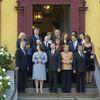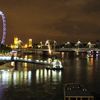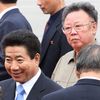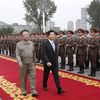2.10.2007 | 14:48
Two Korean leaders
It is perhaps one of the most historical days in a modern Korean history. Two Korean leaders are meeting in Pyongyang for a summit. The Korean peninsula divided by a heavily fortified DMZ (Demilitarised-Zone), the 38 parallel, has been at war since 1950s.
There are both optimistic and sceptic views on this Korean summit. Optimists argue that this will lead to few steps towards eventual reunification of the peninsula, whereas critics say this will bring another “pocket money” into the dictator’s account.
Although this summit should be welcomed by the international community, President Roh of South Korea must be warned that making any naďve concession or emotional approach towards the North would be catastrophic.
Stjórnmál og samfélag | Breytt s.d. kl. 14:50 | Slóđ | Facebook | Athugasemdir (0)
1.10.2007 | 01:07
Burma
The Burmese military regime incites fear, yet they live with fear. Those autocrats such as the Burmese regime, the North Korean and the Zimbabwean etc. fear power of people, hence brutal oppressions. They may or may not know that dictatorship is incompatible with human progress. Perhaps, they know it, yet do not want to admit it. So they act with brutal forces.
I always wonder if there is anyway the international community could intervene into the situation. Yes, national sovereignty does matter a lot. But what about humanity? If the international community built based on universal principles of democracy (human rights, civil liberty, justice, indivisible freedom) doesn’t act, what will prevail? Intervention might sometime be necessary rather than option.
6.9.2007 | 13:34
Clinton on the World
Clinton Q&A on today’s world : METRO Newspaper August 17, 2007
1. What is the fundamental nature of the 21st century world?
A. Nature of the 21st century is “Interdependence“. “Globalisation“ has an exclusive economic connotation.
2. Is it a good or bad thing?
A. “Good and Bad” Interdependence offers ambivalence.
3. How would you like to change it?
A. Characteristic of downside of interdependent world can probably be categorised into three. First, inequality. Second, instability. Third, unsustainability. You need to do something on those three area.
4. What steps are necessary to change it?
A. We should move the world which is unequal, unstable and unsustainable to communities, locally nationally and globally. Every truly successful community has three things in common: Shared opportunity to participate; A genuine sense of shared responsibility for the community’s success; and a sense of belonging. So, how do we move from interdependence to community? First, you have to have security policy. Second you also have to have a more vigorous diplomatic effort. Third, you have to have a policy to fill the world with more friends and fewer enemies.
5. Who's supposed to take those steps?
A. Governments and organisations like the UN have to take the lead in security and diplomacy. But Active involvement of ordinary citizens is vital and necessary.
Clinton argues that every single fundamental problem of the world come is rooted in an imperfect sense of identity. He said “ Do we really believe that our difference are more important than our common humanity?”
23.8.2007 | 21:49
From Bill Clinton: 5 questions

(From Metro Newspaper on August 17, 2007)
Former US President Clinton asks public these 5 questions:
- What is the fundamental nature of the 21st century world?
- Is it a good or bad thing?
- How would you like to change it?
- What steps are necessary to change it?
- Who's supposed to take those nsteps?
-TO BE CONTINUED-
Stjórnmál og samfélag | Breytt s.d. kl. 21:53 | Slóđ | Facebook | Athugasemdir (0)
11.8.2007 | 17:47
The Korean Summit
9.8.2007 | 20:45
Personal Note: Coming home...
31.7.2007 | 21:29
Japan's Abe
21.7.2007 | 18:48
Alan Johnston of the BBC paid a visit to the Amnesty.
17.7.2007 | 23:32
Putin of Russia


Stjórnmál og samfélag | Breytt s.d. kl. 23:34 | Slóđ | Facebook | Athugasemdir (0)
16.7.2007 | 22:52
North Korea and its nukes 2

Stjórnmál og samfélag | Breytt 17.7.2007 kl. 23:25 | Slóđ | Facebook | Athugasemdir (0)
Um bloggiđ
International Politics and World Affairs
Heimsóknir
Flettingar
- Í dag (6.10.): 1
- Sl. sólarhring: 1
- Sl. viku: 2
- Frá upphafi: 90
Annađ
- Innlit í dag: 1
- Innlit sl. viku: 2
- Gestir í dag: 1
- IP-tölur í dag: 1
Uppfćrt á 3 mín. fresti.
Skýringar


















